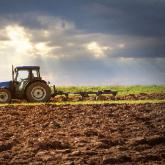CLOCK IS TICKING TO APPLY FOR FARMING IN PROTECTED LANDSCAPES FUNDING
Published 12 December 2022
 In the current economic climate, it’s not often that money is available from government, but farmers and land managers have another 16 months to take advantage of one programme which is aimed at bringing benefits to protected landscapes in Areas of Outstanding Natural Beauty and National Parks (including the Broads).
In the current economic climate, it’s not often that money is available from government, but farmers and land managers have another 16 months to take advantage of one programme which is aimed at bringing benefits to protected landscapes in Areas of Outstanding Natural Beauty and National Parks (including the Broads).
The Farming in Protected Landscapes (FiPL) programme is part of the government’s Agricultural Transition Plan, and offers funding of up to £50,000 for one-off projects which support one of four key aims, and which are located either in an AONB or National Park or which will directly benefit these areas.
The programme works alongside existing agri-environment schemes, which means you can make an application for an specific project even if you already hold a Countryside Stewardship agreement or are entering ELMS, as long as the same work is not paid for twice (i.e. double funding).
As well as demonstrably supporting the protected landscape’s management plan and providing value for money, the project must support at least one of the specified outcomes; supporting nature recovery; mitigating the impacts of climate change; providing opportunities for people to discover, enjoy and understand the landscape and its cultural heritage; and protecting or improving the quality and character of the landscape or place, and supporting sustainable farm business.
Grants of up to £50,000 are available, and projects can be funded by up to 100%, provided no commercial gain will arise from the project (in which case, only a proportion of the project cost will be paid). Unlike some other schemes, the FiPL provides funding for a specific project, rather than for a set period of time.
Allocation is made on a competitive basis – so it’s not just a matter of meeting the criteria, but also of demonstrating how the project will provide value in terms of outcomes, value for money, sustainability, legacy benefits and achievability.
Funding decisions are made locally, by the Broads Authority and Norfolk Coast AONB, and, for larger projects, by a Local Assessment Panel made up of stakeholders such as landowners, statutory bodies and specialists.
The programme started in 2021 and runs until March 2024. Applications can be made at any time and are generally assessed in around six to eight weeks. This is a finite programme with a definite end-date, so farmers and land managers would do well to consider whether they can take advantage sooner rather than later.
The application process is relatively simple, but does involve liaison with the FiPL team at the local protected landscape bodies, as well as potential site visits before completing the application form. It can be worthwhile engaging an agent to help draw the project together and obtain any required consents for a project before applying.
Jamie Manners is rural practice surveyor at Arnolds Keys - Irelands Agricultural.
Share this story
Arnolds Keys Blog

DEMAND FOR FREEHOLD OFFICE BUILDINGS GROWING, SAYS LEADING COMMERCIAL PROPERTY EXPERT
29 November 2022
High demand for freehold office premises in Norwich is driving increased numbers of deals in the city, according to a Norfolk-based commercial property expert, who has announced the bringing to... Read more >

INVESTORS MUST FIND A WAY TO LIVE WITH THE NEW ECONOMIC REALITY
25 November 2022
Jeremy Hunt’s Autumn Statement last week ended up being almost a full-blown Budget, with important announcements on tax and spending. Read more >

CHANGING WEATHER HIGHLIGHTS HAZARDS OF DAMP AND MOULD
22 November 2022
As the weather gets colder and windows are closed to keep the heat in, and as soaring energy prices mean many tenants are delaying the moment when they turn on... Read more >

NORFOLK’S VITAL AND TIMELY FARMING GET-TOGETHER
15 November 2022
After a long period during which any kind of gathering of the farming community has not been possible, more than 300 farmers, producers and supporting industry professionals will be... Read more >
